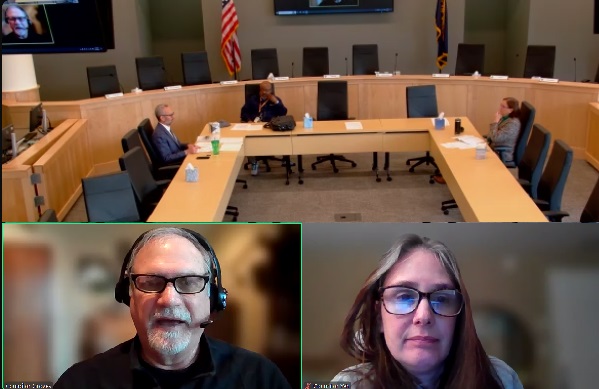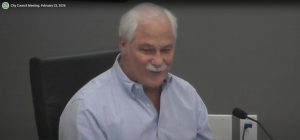City lobbies for alternative shelter funding, reviews 2017 ‘sanctuary’ ordinance
5 min read
Presenter: With the release of the governor’s recommended budget, Eugene officials believe they’re poised for another successful legislative session in 2025. At the Intergovernmental Relations Committee Dec. 4, IGR Manager Ethan Nelson.
[00:00:14] Ethan Nelson (Eugene, intergovernmental relations manager): The governor’s recommended budget came out on Monday. And so the governor’s top three items that she is focusing in on are homelessness and housing, behavioral health, and education.
[00:00:27] That’s great because those first two really align with where the city of Eugene as an organization’s priorities are and IGR’s direction, and, ideally, City Council’s direction, and additionally, where our community is, with the addition of the educational focus that we know that our partners in the school districts are also supportive of the governor’s requests.
[00:00:50] Presenter: After a multi-year lobbying effort by the city, which included tours for the governor’s staff, the legislature will consider funding for Eugene’s safe camping spots. Ethan Nelson.
[00:01:01] Ethan Nelson (Eugene, intergovernmental relations manager): As part of the sustainable shelter work group, we are recommending the addition of a third category of eligible types of shelter, which would include Eugene’s safe camping spots—the safe rest and the vehicle camping.
[00:01:17] And so with this addition of a new category, the allocation of funds should be increased so that there’s funds that are going to keep open existing shelters that the state has funded in the past and existing shelters that are important to addressing homeless emergency, but that the state has not provided funding for in the past…
[00:01:41] And so this is really: ‘Support the expansion of allowable program funding for alternative programs beyond the emergency shelter definition to include safe vehicle parking spots and alternative shelters.’ And then: ‘Partner with Lane County to request funding from the legislature and OHCS to provide full funding to Eugene-based shelters for the ’25-’27 biennium.’
[00:02:01] This is in alignment with the shelter work group’s recommendations, and also the language that was provided to the Homeless and Poverty Board…
[00:02:12] Presenter: The city is also actively helping to define housing-related metrics. IGR manager Ethan Nelson.
[00:02:18] Ethan Nelson (Eugene, intergovernmental relations manager): Senate Bill 1537 had a Section 16, which directed DLCD to recommend to the legislature a program for evaluation considerations and metrics for local infrastructure projects to support housing. DLCD has a draft out of that; city of Eugene, League of Oregon Cities, city of Portland, we’ve reviewed and we’ve been making comments back to DLCD on the viability and the appropriateness of some of the proposed evaluation metrics.
[00:02:52] So we’re pretty heavily engaged in this discussion on how the state would set up a new infrastructure program, and then we’re very supportive and thankful that the governor is proposing $100 million in this biennium to fund that.
Because it would ultimately go to additional infrastructure projects that would range from site-specific, so maybe an affordable housing project here on the river, to a planned area growth. So, potentially a subdivision to then also systemwide infrastructure projects like our program. And so we’re very supportive of that.
[00:03:29] Presenter: The city tightened up its list of priorities. Ethan Nelson.
[00:03:32] Ethan Nelson (Eugene, intergovernmental relations manager): The draft 2025 Eugene State Legislative Priorities document has been condensed down to one page and it has six items on it:
[00:03:42] Number one: Seek long-term funding for unhoused shelter with the ability for state funding to pass through directly to cities…
[00:03:47] So the second is, we’ll seek funding for Clear Lake Road infrastructure…
[00:03:52] Number three: Support increased state investment behavioral health systems, and that is going to be focused in on supporting Lane County’s request for state funding for the Lane Stabilization Center…
[00:04:03] Number four: Support increased protections related to threats to public officials…
[00:04:07] Number five: Secure authority for local governments to prohibit firearms in public buildings…
[00:04:11] And then the sixth is: Improvements to the ground emergency medical transportation system…
[00:04:16] There’s two other items that the council will be discussing. One came out of H(ouse) Bill 3115, which is the codification of the Boise v Martin. So Kathryn Brotherton was here with you all, and you gave direction to have that conversation of: ‘Should the city take a position on repeal?’ And so that’s getting geared on up for a Jan. 29 work session.
[00:04:39] [The second item is a potential bill that would put a ban statewide on rental applications.]
[00:04:45] Presenter: While the city’s priorities are aligned with Gov. Kotek, there were questions about the second Trump administration. Councilor Greg Evans.
[00:04:54] Councilor Greg Evans: So we are a sanctuary city, sanctuary state, and all of that. So, we’re probably going to have to address this at some point in our federal conversations with the new administration. Any clues as to what may or may not come out of the new administration?
[00:05:14] Presenter: Ethan Nelson.
[00:05:15] Ethan Nelson (Eugene, intergovernmental relations manager): The city council passed an ordinance—law enforcement would not be acting on migration status only…
[00:05:25] Councilor Greg Evans: We wouldn’t be cooperating with ICE (U.S. Immigration and Customs Enforcement.)
[00:05:27] Ethan Nelson (Eugene, intergovernmental relations manager): Unless there is a felony or misdemeanor, some charge that is not associated with immigration status. And basically that is what constitutes, quote unquote, a ‘Sanctuary City.’
[00:05:40] Presenter: Councilor Randy Groves.
[00:05:43] Councilor Randy Groves: I understand that we passed motions that preclude the police from just routinely cooperating with ICE, but I’ve also heard both ways, that we are a sanctuary city and I’ve heard that we are not. And my understanding (and I may have this wrong) that there are other additional things that would need to be done to be considered quote unquote ‘a sanctuary city.’ Is that correct?
[00:06:06] Presenter: IGR Manager Ethan Nelson.
[00:06:08] Ethan Nelson (Eugene, intergovernmental relations manager): Councilor Groves, my understanding is that there’s no clear definition of what ‘sanctuary city’ is and when we speak about the position of the city of Eugene, we don’t use that terminology. (Okay.) We were very clear to say that how we approach some of those issues is related to the ordinance that the City Council passed.
[00:06:32] We’ve sidestepped political language around this concept of sanctuary city, and said it is a term that is sometimes ill-defined, and you are correct that sometimes, because of the ordinance that has been passed, Eugene is identified by external sources as a sanctuary city. And then at other times, because we don’t have all of the other potential policy elements that other cities take, that we are not identified by external sources there.
[00:07:01] Internally and officially, we don’t utilize those terms. We just kind of point to the ordinance that was passed.
[00:07:07] Councilor Randy Groves: That’s the clearest explanation I’ve been given. And I’m not trying to get into the pro or con. I’m just trying to figure out what are we, so I can answer accurately when I am asked that question.
[00:07:20] Presenter: Mayor Lucy Vinis.
[00:07:21] Mayor Lucy Vinis: The other thing I would say, Randy, is that we are aligning with the Tenth Amendment and states’ rights, right? (Okay.) That is actually what we have done.
[00:07:30] Presenter: The city looks for state recognition and funding for its sleep sites, and hopes the Tenth Amendment will protect Eugene immigrants from the second Trump administration.




